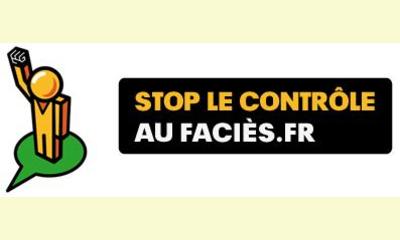|
|
Stop Police Profiling
un article par Gwenaëlle Beauvais
In France we have a certain number of judicial measures that guarantee the pertinence of arrests by the police. However, with regard to a "simple" identity check, the guarantees are less evident. The decision is left to the police officer to decide on his own the pertinence of stopping a citizen. An identity check is not a minor thing; it implies a momentary denial of freedom to come and go.

click on photo to enlarge
In October 2005, two boys were killed when they tried to escape from a police identity check in the suburbs of Paris. At that time, it was difficult to believe that citizens of France would prefer death to an identity check, but the event gave serious cause for reflection.
In the view of the Collective Against Profiling, the unhealthy climate that exists between the police and certain citizens comes in part from "the systematic practice of profiling which stigmatizes part of the population in a way that is illegal, abusive and ineffective." These acts provoke humiliation and defiance against police authority. According to a recent study by the National Center for Scientific Research (CNRS), an individual perceived as young and black or Arab is 8-11 times more likely to be controlled than an individual who is white and older). Similarly, according to its 2008 report on youth, the National Commission on the Ethics of Security (CNDS) found it necessary to point out that "in particular, it is important to avoid identity checks without cause or by profiling, or in inappropriate places, or unnecessary measures of coercion, as well as illegitimate violence."
In order to put a stop to these practices a collective developed over time as a result of individual initiatives by individual men and women, police officers and associations. Working together, they proposed solutions: a policy that targets of identity checks must receive a written receipt; the creation of an independent commission involving police and civil society; and the modification of existing laws that are an obstacle to recourse in the case of discrimination.
In the face of "denial" by the Ministry of the Interior, the collective decided to carry out a massive action for justice. Therefore, in July 2011, any persons who considered that they were victim of an abusive identity check had the possibility to send an SMS message to the collective describing the event (place, date, hour, stated reason for the check, result of the check, and what happened afterwards). The success of this approach was beyond expectation. Hundreds of SMS messages were received and French personalities bore witness.
It is clear that this is an affair of social dignity and peace. The collective seems to be carrying out a civic struggle that should draw the attention of us all, because, in the words of Jean Pierre Dubois, President of the League of Human Rights, it is "the key to a livable common future."
For more information, see:
Website: www.stoplecontroleaufacies.fr
Facebook : Groupe Stop Le Contrôle Au Facies
Email : stoplecaf@gmail.com
(Click here for a French version of this article)
|








|
DISCUSSION
Question(s) liée(s) à cet article:
Is there a new international generation of human rights activism?,
* * * * *
Commentaire le plus récent:
CPNN has been enriched over the years by the young human rights activists who take part in the Annual UNESCO International Leadership Forum. This is truly the hope for our future!

|
|









